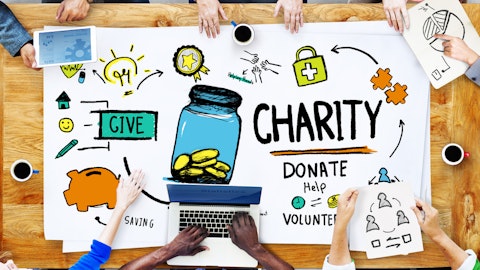In this article, we will be taking a look at the 25 biggest pharmaceutical companies in the world. To skip our detailed analysis, you can go directly to see the 10 biggest pharmaceutical companies in the world.
There is no need to emphasize the value of the pharmaceutical industry after the Covid-19 pandemic. Without the immediate advancements that pharma companies came up with to developed the Covid-19 vaccine, it is very likely that the world would still be fighting the pandemic which in two years devastated the global economy. The development of vaccines by some of the biggest pharmaceutical companies in the world at a pace that surprised every single person led the inoculation of hundreds of millions worldwide and brought an early end to the pandemic.
Even though pharmaceutical indexes, including the iShares U.S. Pharmaceuticals ETF, recorded a total return of -4.78% in 2022, this return has been better than the S&P 500 index return of -19.44% in the same time period. Even though a negative return seems to indicate an industry floundering, the truth is that U.S. shares have suffered greatly as a result of rising inflation and interest rates, while the threat of an imminent recession did not help matters. Hence, comparing returns from pharmaceutical indexes to S&P 500 returns provides a more accurate picture, one that shows pharma companies performed well above the average.

adriaticfoto/Shutterstock.com
The 2023 outlook for the pharma industry seems quite interesting. According to PwC, areas of activity in 2023 will focus on high growth opportunities, which means that mergers and acquisitions will focus more on oncology and immunology, while other areas including vaccines, cardiovascular diseases and central nervous systems diseases will also be areas of focus. In 2022, the total value of merger and acquisition deals was $158.5 billion, a significant fall of around 40% vs 2021 with the biggest such deal being the $30 billion acquisition of Horizon Therapeutics by Amgen Inc. (NASDAQ:AMGN). The greatest value in the pharma industry lies in developing solutions for unmet medical needs for which the market will place a premium. The aforementioned decrease in M&A shows headwinds being faced by the medtech sector while uneven capital market performance hasn’t helped the situation. Deals have always been a major part of the pharma industry and despite the area stagnating in 2022, the expectation is that deals will continue to increase in 2023 as inorganic growth is still expected to drive overall growth.
Meanwhile, Sanofi (NASDAQ:SNY) lost out on its bid for Horizon Therapeutics but the pharma giant, which is one of the biggest pharmaceutical companies in the world, is purchasing Provention Bio, a pharma company specializing in diabetes, for $2.5 billion, at $25 per share in cash, which brings us to another interesting point; cash is king in the pharma industry as the biggest pharmaceutical companies in the world are taking advantage of biotech companies hemorrhaging cash, mainly because of an IPO slump in the previous year and an impending recession leaving little options to raise cash. As many biotech companies are facing cashflow issues, the competition for private funding is higher and public markets are basically closed off for them, getting offers from pharmaceutical companies seems to be the only option for these companies. Since cashflow is an issue, most biotech companies prefer purchases in cash as opposed to the traditional method of buying a company in exchange for shares or a combination of shares and cash.
Recently, Pfizer Inc. (NYSE:PFE) announced the acquisition of Seagen, an oncology focused biotech company, for $43 billion, as the pharma giant has used its extra earnings and profits from its successful Covid-19 vaccine to ramp up purchases. Not only does this give Pfizer Inc. (NYSE:PFE) a huge advantage in a segment which is considered to be the future of pharma, it also allows the company to substitute this purchase for its R&D expense. When a company acquires another company, the purchase price isn’t taken to the profit and loss but the balance sheet, which means it doesn’t impact the net profit of the company. This in turn means that even though this $43 billion purchase is technically an R&D expense for Pfizer Inc. (NYSE:PFE), by purchasing a company, the company’s price earnings ratio looks lower and more attractive to investors, since its earnings aren’t reduced. “We aren’t acquiring the golden eggs, we are buying the goose that lays the golden eggs,” said Albert Bourla, Pfizer’s CEO.
One of the challenges that the pharmaceutical industry is facing is generics threatening the market share of the biggest pharmaceutical companies in the world, as loss of patents, licenses and trademarks of major revenue generating drugs is allowing generic pharma companies to enter the space and provide drugs at a much lower cost, thus gaining more market share. In many countries, governments are encouraging local generic manufacturers with subsidies and grants as opposed to multinationals to allow residents to purchase cheaper drugs. In the next decade, pharma companies are expected to lose billions of dollars in revenue while there isn’t enough in R&D pipelines to offset this revenue loss completely, which is another reason why M&A rule the pharma world.
Another area that has seen further developments in recent years is the HIV segment. While HIV has existed for decades now, there are some exciting changes in the area, with a third person becoming free of HIV after receiving virus-resistant cells, though the risks linked to the procedures mean that widespread treatment is still unlikely for the foreseeable future. In addition, while traditionally HIV pills have been required to be ingested every single day or even multiple dosages a day, advancements in drugs have allowed the development of new PrEP medication which significantly reduces a person’s dosage to just every other month, with three companies having PrEP drugs approved by the CDC for usage.
According to Fitch, the outlook for the pharma sector is neutral as despite inflationary measures and higher interest rates, a supportive operating environment still remains. Meanwhile IQVIA Holdings Inc. (NYSE:IQV), which provides data on the health information and clinical research, stated that the Covid-19 pandemic’s beneficial impact to the pharmaceutical industry is expected to add $500 billion to the industry from 2020 to 2027, with the biggest growths expected in Africa, Latin America and Asia, due to greater excess, higher demand and an increasing population. Meanwhile, low growth is expected in the U.S. and Europe, which for most of the biggest pharmaceutical companies in the world, are their biggest markets. Biotech is also the biggest thing in pharma right now, which is why it’s worth getting a head-start in this space by considering the most undervalued biotech stocks.
The biggest pharmaceutical companies in the world have a combined market cap exceeding $3.5 trillion, while their trailing twelve month (TTM revenue) exceeds $1 trillion. To determine these companies, we checked their latest market cap and TTM from Yahoo finance, with our rankings based on their average ranking for both criteria. So, let’s take a look at the pharma giants, starting with:
25. Teva Pharmaceutical Industries Limited (NYSE:TEVA)
Total market cap as at 26 Feb 2023 (in billions): $11.1
Total TTM revenue of the company (in billions): $14.9
Teva Pharmaceutical Industries Limited (NYSE:TEVA) is the largest Israeli pharmaceutical company, which recently announced that it was taking its 2nd long-acting schizophrenia drug into phase 3.
24. Otsuka Holdings
Total market cap as at 26 Feb 2023 (in billions): $16.5
Total TTM revenue of the company (in billions): $12.1
Otsuka Holdings is one of the various companies which is contributing to huge growth in the digital pills market.
23. Astellas Pharma
Total market cap as at 26 Feb 2023 (in billions): $25.5
Total TTM revenue of the company (in billions): $10.8
Astellas Pharma is a Japanese company and was recently in the news for introducing a first of its kind to treat anemia associated with chronic kidney disease in Egypt.
22. Biogen Inc. (NASDAQ:BIIB)
Total market cap as at 26 Feb 2023 (in billions): $39.0
Total TTM revenue of the company (in billions): $10.2
As its name suggests, Biogen Inc. (NASDAQ:BIIB) is a biotech company. The CEO of Biogen Inc. (NASDAQ:BIIB) recently stated that he is hopeful that the high-profile launches of drugs Leqembi and Zuranolone are going to help improve growth rates of the company.
21. Daiichi Sankyo
Total market cap as at 26 Feb 2023 (in billions): $61.6
Total TTM revenue of the company (in billions): $8.7
The Japanese pharma giant is set to establish the first mRNA vaccine plant in Japan with a capacity of 20 million doses annually by 2024.
20. Viatris Inc. (NASDAQ:VTRS)
Total market cap as at 26 Feb 2023 (in billions): $14.0
Total TTM revenue of the company (in billions): $16.7
Formed in 2020 as a result of a merger, Viatris Inc. (NASDAQ:VTRS) is well-know for its OTC assets, with plenty of pharma companies interested in obtaining the 3 billion euros portfolio.
19. Boehringer Ingelheim
Total market cap as at 26 Feb 2023 (in billions): N/A
Total TTM revenue of the company (in billions): $21.3
The largest private pharma company in the world, Boehringer Ingelheim reported positive data from a recent trial of its treatment for GPP flares.
18. Takeda Pharmaceutical Company Limited (NYSE:TAK)
Total market cap as at 26 Feb 2023 (in billions): $48.7
Total TTM revenue of the company (in billions): $29.0
Takeda Pharmaceutical Company Limited (NYSE:TAK) is Japan’s biggest pharmaceutical company and recently acquired a subsidiary of Nimbus Therapeutics, promising to make two milestone payments, each of $1 billion.
17. Gilead Sciences, Inc. (NASDAQ:GILD)
Total market cap as at 26 Feb 2023 (in billions): $100.6
Total TTM revenue of the company (in billions): $27.3
Gilead Sciences, Inc. (NASDAQ:GILD) is the largest HIV company in the world, driven by its biggest drug Biktarvy.
16. Amgen Inc. (NASDAQ:AMGN)
Total market cap as at 26 Feb 2023 (in billions): $124.8
Total TTM revenue of the company (in billions): $26.3
Amgen Inc. (NASDAQ:AMGN) was responsible for the biggest M&A deal in the pharmaceutical world in 2022, with 99% of Horizon Therapeutics shareholders approving the deal, with the company selling a $24 billion investment-grade bond to finance this deal.
15. GSK plc (NYSE:GSK)
Total market cap as at 26 Feb 2023 (in billions): $71.9
Total TTM revenue of the company (in billions): $35.4
The biggest news concerning GSK plc (NYSE:GSK) in the past one year was its separation of its consumer healthcare business in a completely separate company, which is why its revenue is so low compared to previous years. However, it is still easily one of the biggest pharmaceutical companies in the world as it has rebranded itself as a leading biotech company.
14. Sinopharm
Total market cap as at 26 Feb 2023 (in billions): $8.6
Total TTM revenue of the company (in billions): $67.9
Sinopharm was one of the leading Chinese Covid-19 manufacturers and has the 4th highest revenues of any pharmaceutical company.
13. Abbott Laboratories (NYSE:ABT)
Total market cap as at 26 Feb 2023 (in billions): $174.6
Total TTM revenue of the company (in billions): $43.7
Abbott Laboratories, which primarily manufactures medical devices which has made it one of the biggest pharmaceutical companies in the world, is now facing an FTC and SEC investigation because of a nationwide infant formula shortage which has resulted in almost 400 lawsuits being filed.
12. Sanofi (NASDAQ:SNY)
Total market cap as at 26 Feb 2023 (in billions): $119.3
Total TTM revenue of the company (in billions): $48.0
The largest vaccine company in the world, Sanofi (NASDAQ:SNY) also recently secured a nod from the Food and Drug Administration (FDA) for its drug Altuviio, for hemophilia A.
11. Bristol-Myers Squibb Company (NYSE:BMY)
Total market cap as at 26 Feb 2023 (in billions): $147.3
Total TTM revenue of the company (in billions): $46.2
Bristol-Myers Squibb Company (NYSE:BMY)
Click to continue reading and see the 10 biggest pharmaceutical companies in the world.
Suggested articles:
- 15 Best Value Stocks to Buy According to Bill Miller
- 10 Dividend Stocks that George Soros Owns
- 12 High Growth Semiconductor Stocks That Are Profitable
Disclosure: None. 25 biggest pharmaceutical companies in the world is originally published at Insider Monkey.





